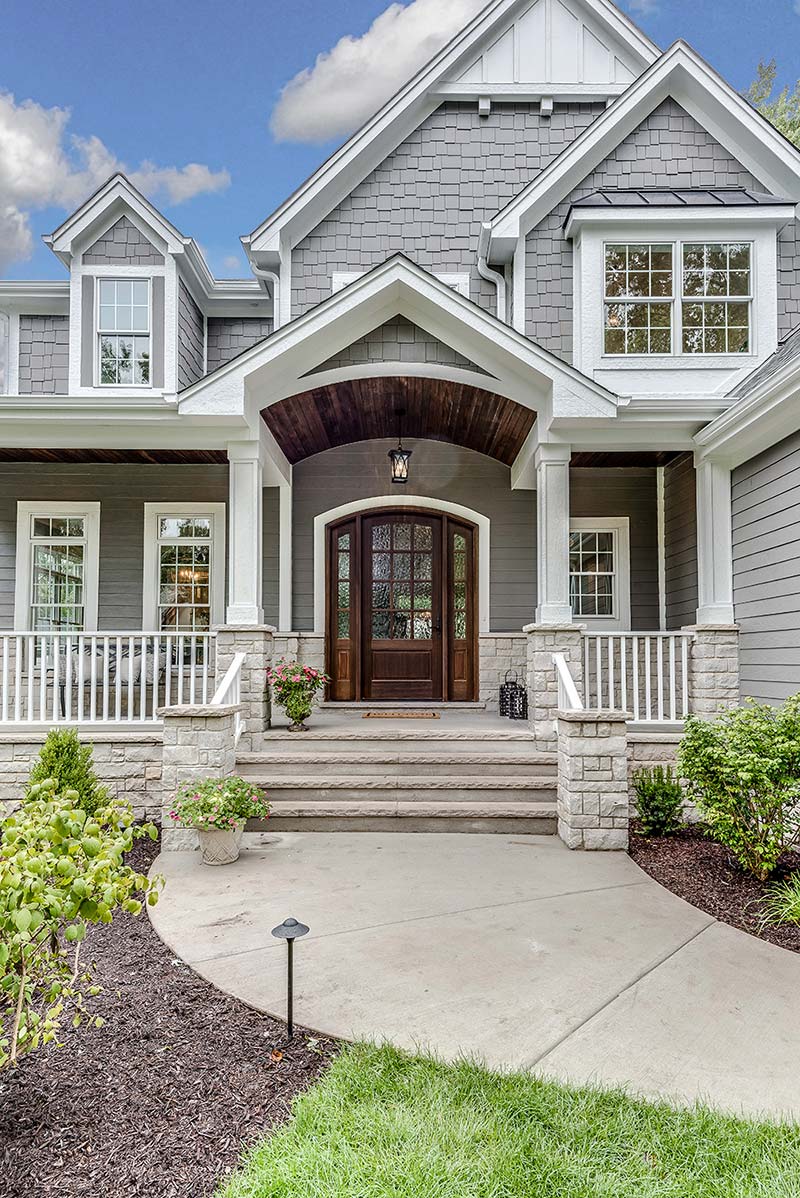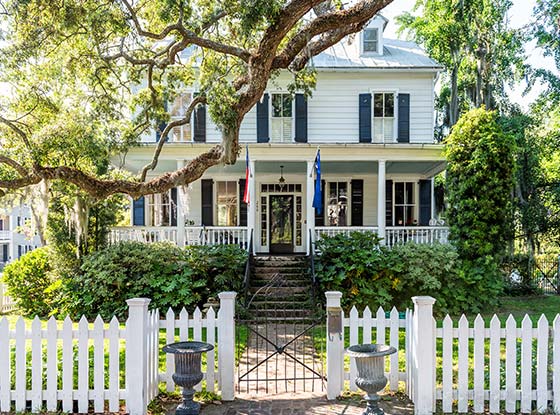Few purchases give you a sense of pride and accomplishment like buying a new home. From white picket fences and lush green grass to cookouts with neighbors and holidays with the family, owning a home is magical. Like most great things, though, enduring the home-buying process takes a lot of work. There are many steps to take and difficult decisions to make along the way. One of the most crucial decisions is what type of home loan and mortgage broker to choose. Whether it's your first time buying a home or you're a seasoned owner with multiple properties, you will need a trusted mortgage broker in Knightsville, SC, with your best interests at heart.
If you're like most people, you need a mortgage professional whose top priority is their customers - an expert who can provide accurate advice and guidance so you can make educated decisions. That's where Mission One Mortgage comes into the picture.
DifferenceThe Mission One Mortgage Difference

Whether you want the best interest rates or don't know where to start in the home-buying process, Mission One Mortgage can set you up in the right direction. From getting you pre-qualified to buy a home to securing a veteran's loan, Mission One Mortgage is the trusted solution you need. As Knightsville natives, we're proud to serve the Lowcountry and all of South Carolina with trusted mortgage brokerage services.
Unlike some mortgage companies in Knightsville, SC, we bring years of high-level experience and insight to the table. Having worked with hundreds of clients during our time in business, we know you're probably going through a range of emotions right now. Buying a new home can be a scary process, especially for first-time buyers. That's why we make every effort to make ourselves accessible and available for clients. Our primary goal is to help you make the right mortgage for your family and your budget.
Our Services
- Mortgage Broker Knightsville, SC
- The Mission One Mortgage Difference
- Why Should I Work with a Mortgage Broker in Knightsville, SC
- Exploring the Benefits of Working with a Mortgage Broker
- Common Home Loan Options in South Carolina
- Home Mortgage FAQs
- Mission One Mortgage: Turning Dreams into Reality, One Mortgage at a Time
Service Areas
We know that many home loan officers have horrible reputations. Some brokers only see their clients as transactions, and a means to make quick money. They come off as impatient and pushy, failing to understand that this is a very big decision for you. At Mission One Mortgage, we take the opposite approach. We encourage our clients to take as much time as needed to ask us questions and review mortgage documents. We could say that our mission is to exceed your expectations, but we'd rather just show you. From assistance finding FHA, VA, or other loans to refinancing your current mortgage, Mission One is the team you can trust.
Here are just a few reasons why home buyers choose Mission One Mortgage:
Why Should I Work with a Mortgage Broker in Knightsville, SC?

Most people simply don't have access to the hundreds of thousands of dollars needed to purchase a home with cash. Instead, they take out a mortgage loan to buy a home. Unfortunately, many homebuyers are anxious to get the ball rolling and, due to their excitement, fail to shop around for the best mortgage rates. To some degree, avoiding this step makes sense, as it requires a lot of legwork and research to get the job done. For those not wanting to spend hours researching a reasonable mortgage, there's an alternative to consider - working with a mortgage broker.

To understand the benefits of working with a mortgage broker, you must first understand their role in the home-buying process.
What Does a Mortgage Broker Do?
Your mortgage broker is a third party that works to connect you with mortgage lenders. Essentially, a mortgage broker works as an intermediary between a person who wants to buy a home and the entities offering loans to buy a home. The mortgage broker works with both the borrower and lender to get the borrower approved. They also verify and collect paperwork from the borrower that the lender needs to finish a home purchase. Typically, mortgage brokers have relationships with several home loan lenders. Mission One Mortgage, for example, has access to 50 different lenders, which gives us a wide range of home loans in Knightsville, SC, from which to choose.
In addition to finding a home loan lender, your mortgage broker will help you settle on the best loan options and interest rates for your budget. Ideally, your mortgage broker will take a great deal of stress and legwork off your plate while also potentially saving you money.
Help with the Pre-Approval Process
If you're ready to buy a home, getting pre-qualified is a great choice that will streamline the entire process. Your mortgage broker makes getting pre-approved easy by obtaining all the documents needed to get you pre-qualified. In taking a look at your application, they will determine if you're ready for the pre-approval process. If your application needs additional items, the mortgage company will help point you in the right direction to ensure your application is as strong as it can be. Your mortgage broker will also walk you through the different types of loans, from Conventional and FHA to VA and USDA.
In order to be pre-approved for a home in South Carolina, you must have the following:
- Two Years of W2 Forms
- 30 Days of Pay Stubs from Employer
- 60 Days of Bank Statements
- A Valid Driver's License
BenefitsExploring the Benefits of Workingwith a Mortgage Broker

Most people choose to use a mortgage broker because they have access to different lenders and interest rates. But a great mortgage broker brings more to the table than a choice of lenders.
Save You from Unneeded Stress:One of the biggest advantages of hiring a mortgage broker is that they can find and vet loans while managing the mortgage process on your behalf. The best mortgage companies, like Mission One Mortgage, hire brokers who are experts at keeping underwriting on track, coordinating with relevant parties, and handling all paperwork involved. At the end of the day, mortgage brokers save you stress and time and often expedite the closing process.
More Access: We touched on this earlier, but it bears repeating: A mortgage broker provides access to a range of loans, rates, and lenders. In fact, many mortgage brokers can get rates lower than what the average person could get from a lender.
Save You Money: There's a chance that your mortgage broker can get your mortgage fees reduced or waived by the lender, which could save you a good deal of money.
Help with Unfavorable Financial Situations: Expert mortgage brokers can often assist in challenging financial situations, like when a buyer has inconsistent income or less-than-perfect credit. Experienced brokers, like those at Mission One Mortgage, are often aware of lenders willing to will work with nontraditional borrowers.
Provide Key Insights: Mortgage brokers share important insights, such as your chances for a home loan approval and exactly how much house you can afford. They can also save you from making costly mistakes based on their years of expertise in the mortgage industry.

Home LoanCommon Home Loan Options in South Carolina

While settling on the best type of home loan isn't as exciting as searching for the home of your dreams, it's equally important. Yes, your Mission One Mortgage loan officer in Knightsville, SC, will be happy to help explain the differences between home loans. But understanding the basics ahead of time will save you stress and time in the long run.
Contact Us For Service !
Free Consultation (843) 822-5685
(843) 822-5685
Conventional Mortgages
Conventional loans can be used to purchase a new home or refinance your current one. Conventional loans include fixed-rate mortgages and adjustable-rate mortgages. Generally, borrowers must put down a 3% down payment for owner-occupants, 10% for a vacation property, and 20% for an investment home. If you are able to pay 20% of the total cost of the home, you can avoid private mortgage insurance, which is otherwise required. Conventional mortgages are often preferred by buyers with good credit or people needing a non-owner-occupied mortgage.


FHA Loans
FHA mortgages are issued by the U.S. government and backed by the Department of Housing & Urban Development (HUD). This loan is often preferred by first-time homebuyers because it only requires a 3.5% down payment and offers more flexibility with credit requirements and underwriting standards. FHA loans have several requirements you must meet to qualify. Contact Mission One Mortgage today to learn more about FHA loans and whether or not they're best for your financial situation.
USDA Loans
Also backed by the government, these loans are insured by the U.S. Department of Agriculture and don't require money down. These loans have lower insurance requirements when compared to FHA loans, offer 100% financing if you qualify, and allow for closing costs to be covered by the seller. In order to qualify for a USDA loan, you must live in a rural area, and your household income must meet certain standards. These loans are often preferred by low-income citizens who live in rural parts of South Carolina.


Veteran Mortgages
Also known as VA or Veteran's Affairs loans, these mortgages are reserved for the brave men and women who served in the military. VA loans help provide our military members, veterans, and their families with favorable loan terms and an easy home ownership experience. Often, those who qualify are not required to make a down payment on their home. Additionally, these loans often include less expensive closing costs.
If you are a veteran or the family member of a veteran, contact Mission One Mortgage today to speak with our Vetted VA Professional, Debbie Haberny. Debbie helps our military members, veterans, and their family members obtain home loans utilizing veteran benefits and would be happy to help as you search for a home.
FAQsHome Mortgage FAQs

Do you have questions about the complexities of mortgages and home loans? As your advocate, Mission One Mortgage is here to answer any questions you have about mortgages and the home-buying process. We encourage you to call our office to speak directly with one of our mortgage experts or continue reading below for answers to some frequently asked questions.
Q. I was talking to my spouse about mortgage brokers, and they mentioned the phrase home loan originator. What's the difference between a broker and a loan originator?
A. The mortgage industry is full of confusing jobs and titles, making it easy to confuse roles and responsibilities. Such is the case with mortgage brokers and home loan originators. Though their roles share similarities, a home loan originator in Knightsville, SC, works for a bank or credit union, while a mortgage broker works for a brokerage company. Home loan originators and mortgage brokers are both licensed by the Nationwide Multistate Licensing System (NMLS).
Q. I've heard from everyone that you must have mortgage insurance to buy a home. What is mortgage insurance?
A. Essentially, mortgage insurance helps protect lenders if a borrower forecloses on the home they bought. One advantage of mortgage insurance is that when borrowers pay it, lenders can often grant loans to buyers when they might not have otherwise. Though not always required to buy a home, mortgage insurance is often needed for down payments of less than 20%.
Q. I have just been pre-approved to buy a beautiful home in South Carolina. Is there anything I shouldn't do now that I'm pre-qualified?
A. Mortgage companies like Mission One Mortgage, make getting pre-qualified for a home easy. However, as your loan process continues, your lender is required to run a new credit report before closing on a home. For that reason, it's to avoid any activity that might affect your credit score, such as:
- Do not become a co-signer on a loan with someone else.
- Do not quit or change your job.
- Do not apply for new credit cards, automobile loans, or any other lines of credit.
- Do not use your credit card to pay for large purchases, like furniture for your new house.
- Do not avoid payments on current lines of credit, loans, or utility bills.
Q. My brother-in-law recently refinanced his home in South Carolina. What is refinancing, and should I consider refinancing my home too?
A. Refinancing your home basically means you're swapping your current mortgage for a new one, most often with a lower interest rate. If you would like to reduce the term of your loan, lower your monthly mortgage payments, or consolidate debt, refinancing may be a smart option. Many homeowners also choose to refinance if they want to switch from adjustable-rate mortgages to fixed-rate mortgages or to get cash back for home renovations. To learn whether refinancing is a viable option for your situation, contact Mission One Mortgage ASAP, as loan rates change frequently.
Mission One Mortgage: Turning Dreams into Reality, One Mortgage at a Time

Here at Mission One Mortgage, we believe that the best communities begin with the dream of home ownership. Our mission is to make those dreams come true, with personalized service, expert guidance, and good old-fashioned hard work. As one of the most trusted mortgage companies in Knightsville, SC, we have years of experience working with a diverse range of clients, from first-time buyers and investors to self-employed borrowers and non-native English speakers.
Though every mortgage situation is different, one thing never changes: our commitment to clients. Contact our office today to get started on an exceptional home-buying experience.
Contact Us For Service !
 (843) 822-5685
(843) 822-5685

Latest News in Knightsville, SC
Southeast law firm opens Charleston outpost amid hot Carolinas legal market
Chinekwu Osakwehttps://www.reuters.com/legal/legalindustry/southeast-law-firm-opens-charleston-outpost-amid-hot-carolinas-legal-market-2022-09-12/
(Reuters) - Baker Donelson is continuing its expansion in the Carolinas by opening a Charleston, South Carolina office, the firm said Monday.The Southeast U.S. regional law firm opened an office in Raleigh, North Carolina, in October and has had a Columbia, South Carolina office since 2016. It hired lawyers away from Womble Bond Dickinson and Parker Poe for its new Charleston office.The move comes in a busy year for legal markets across the Carolinas. Greenberg Traurig ...
(Reuters) - Baker Donelson is continuing its expansion in the Carolinas by opening a Charleston, South Carolina office, the firm said Monday.
The Southeast U.S. regional law firm opened an office in Raleigh, North Carolina, in October and has had a Columbia, South Carolina office since 2016. It hired lawyers away from Womble Bond Dickinson and Parker Poe for its new Charleston office.
The move comes in a busy year for legal markets across the Carolinas. Greenberg Traurig said in April that it hired a Winston & Strawn partner to open a Charlotte office. Another Florida-founded global firm, Holland & Knight, expanded its Charlotte office in June with five private equity partners from Moore & Van Allen. Dallas-based Haynes and Boone also expanded in Charlotte with the addition of three lawyers in October.
Milwaukee-based law firm Michael Best & Friedrich said in January that it acquired the 23-lawyer Forrest Firm, adding offices in Asheville, Charlotte, Durham, Greensboro, Grenville, Wilmington and Winston-Salem.
The founding shareholders in Baker Donelson's new Charleston office are health law attorneys Alissa Fleming and Catherine Wrenn, who joined from Womble, and corporate attorney Ashley Cooper and employment attorney Jennifer Dunlap, who joined from Parker Poe.
A representative from Womble did not immediately respond to requests for comment. Kristen Leis, chief marketing and business development officer at Parker Poe, said the number of attorneys at the firm grew 38% over the last three years and it is "unequivocally" looking to grow in Charleston.
Mark Carlson, Baker Donelson's chief growth officer, said the firm is working to create full service offices in its Carolinas locations.
"We have missed out on opportunities in North and South Carolina because we haven't had enough boots on the ground," he said.
(NOTE: This update includes a correction in a reference to a 38% percent increase in partner head count at Parker Poe to reflect that the increase includes all attorneys.)
Read more:
Reince Priebus' law firm expands in North Carolina
Haynes and Boone adds three Cadwalader lawyers in North Carolina
Our Standards: The Thomson Reuters Trust Principles.
New Knightsville restaurant shows how Summerville area’s dining scene is changing
Parker Milner pmilner@postandcourier.comhttps://www.postandcourier.com/food/new-knightsville-restaurant-shows-how-summerville-areas-dining-scene-is-changing/article_2b89af68-0bab-11ee-bd9f-e785512bcf66.html
SUMMERVILLE — Tables begin to fill up just past noon at a restaurant 31 miles from downtown Charleston.Surrounded by chain eateries in a Publix-anchored strip mall, La Cuisine Du Chevalier — or La Chev, as most call it — has the buzz of an energetic lunch crowd ready for some midday human interaction.A trio of women attempt to corral four children while dunking grilled bread into large white bowls of bouillabaisse, brimming with mussels, shrimp and white fish, all steeping in saffron broth.Empty black s...
SUMMERVILLE — Tables begin to fill up just past noon at a restaurant 31 miles from downtown Charleston.
Surrounded by chain eateries in a Publix-anchored strip mall, La Cuisine Du Chevalier — or La Chev, as most call it — has the buzz of an energetic lunch crowd ready for some midday human interaction.
A trio of women attempt to corral four children while dunking grilled bread into large white bowls of bouillabaisse, brimming with mussels, shrimp and white fish, all steeping in saffron broth.
Empty black shells are pushed aside at another round mahogany table, where two friends catch up over mussels and glasses of iced tea.
A man sitting solo at a two-top finishes his meal and tells the server he will be back next week.
These are the sights and sounds of a restaurant that’s become a neighborhood lunchtime favorite less than a year after quietly opening in November 2022.
I would have never found La Chev without a tip from a colleague, but I’m glad I came. That satisfaction extends to residents of the Knightsville and Summerville area, who have thanked owner Jason Tucker for bringing his Southern take on French cuisine to them rather than downtown Charleston.
“A lot of people were confused about why I did it here,” said Tucker, a Summerville resident. “I saw the direction of where the homes are going.”
Tucker struck out on his own after cutting his professional teeth at restaurants in Charleston’s French Quarter. Inside the strip center space that previously housed a Ladles sandwich and soup shop, the Johnson & Wales University graduate is teaming up with La Chev’s chef de cuisine, Jonathan DuPriest, who grew up in Knightsville.
Whether it’s crab dip with grilled bread or seared scallops over French onion cheese risotto, DuPriest is consistently coming up with new daily specials that the restaurant posts on its Facebook page, which takes the place of an actual website.
La Chev boasts separate lunch and dinner menus, but there are several crossovers, including the shrimp and grits, crab croquettes and yellowfin tuna — a dish that stood out after two visits to the restaurant.
The lightly-seared tuna, served cold, rests on a steaming hot medley of chopped asparagus, corn, confit tomato and cubed bacon. A speckled cream sauce pulls the vegetables together, adding sweet smokiness to the fresh but mild fish.
“It doesn’t just play with your taste buds, it plays with the temperature sensitivities of your palate, as well,” Tucker said.
With a nice crust and firm pink center, the tuna hits all corners of my mouth, leaving soft, peppery spice behind. Though served as an appetizer, I enjoyed it as my full meal with an order of duck coq au vin dumplings — a fun riff on a French classic — on the side.
During dinner, the white tablecloths are brought out and topped with larger appetizers and mains that allow for some “Lowcountry liberties,” Tucker said.
For instance, crab croquettes are more petite crab cake than filled-and-fried roll, but the flawed descriptor doesn’t take away from each delicate bite. Paired with a light and bright diced cucumber salad, the patties’ crab-to-filler ratio favors the former.
A trio of cheese-adorned meatballs, floating in tomato ragù and served with small wedges of garlic bread, is another appetizer that satisfies without reinventing the wheel.
The same can often be said for the restaurant’s dinner entrees.
Roasted salmon, stuffed with crab and served atop crisp green beans, is one example of an expertly cooked daily special. On the side, Carolina Gold rice is bound with cheese to form a thick patty, bringing substance and salt to the Southern grains.
Steak, which appears to have been marinated and spent some time in the oven, makes up for a lack of crust with a juicy, tender texture — almost reminiscent of the roasted filet of beef my mother serves at Christmas.
Of the six dishes I sampled at La Chev, each one left me without complaints.
There isn’t much in the way of décor, more noticeable during a Monday night dinner service that saw just two occupied tables between 5:45 and 6:45 p.m. This was a far cry from the crowded lunch service I witnessed weeks before, making me ponder if ownership might consider closing their doors on Monday, typically the slowest dining day of the week.
It also made me wonder if this type of restaurant — a place that skirts the line between neighborhood establishment and one worthy of a special night out — can work in this location.
I remain optimistic.
While it’s just four miles from the town’s top restaurants — Laura, Bexley and La Rustica, among others — it’s less crowded and closer to home for many Summerville restaurants.
And as those who have dined at La Chev have likely realized, there isn’t anything like it in Knightsville.
Meet the owner of Summerville’s only French-inspired restaurant
Contributing Writerhttps://charlestonbusiness.com/meet-the-owner-of-summervilles-only-french-inspired-restaurant/
Listen to this articleJason Tucker reports that business is booming at the boîte known as La Cuisine du Chevalier, or La Chev, by the locals. The 40-seat restaurant, which translates to “the knight’s kitchen,” garnered rave reviews by online contributors when it opened in November at the former soup restaurant called Ladles in the Shoppes of Summerville.It only recently held a grand opening celebration.Tucker, who has lived in Summerville for the past 16 years, is no stranger to the restaurant bus...
Listen to this article
Jason Tucker reports that business is booming at the boîte known as La Cuisine du Chevalier, or La Chev, by the locals. The 40-seat restaurant, which translates to “the knight’s kitchen,” garnered rave reviews by online contributors when it opened in November at the former soup restaurant called Ladles in the Shoppes of Summerville.
It only recently held a grand opening celebration.
Tucker, who has lived in Summerville for the past 16 years, is no stranger to the restaurant business.
“My background is extremely diverse and it started back when I was 15-years’ old scooping ice cream in Central Pennsylvania,” he said.
Related content: Charleston rooftop bar, restaurant to renovate, rebrand
Over the years, Tucker has worked in numerous restaurants, from chains like Buffalo Wild Wings, Cracker Barrel and the Hilton, to groups like Charleston Hospitality and more. After bartending his way through college in Virginia, the hard-working transplant accepted a management position from his employer, which took him to Summerville, where he has been ever since.
The father of two boys is also the operating partner at Wine & Tapas in Summerville and was buoyed by the popularity of the business. This inspired him to open a new restaurant, this time with a French flair.
“They call the area the French Quarter, but it lacked a French-themed restaurant, which never made sense to me, especially with the growth we are seeing in this area,” he said.
Tucker said that La Chev was designed to evoke the feeling of walking down the Champs-Élysées.
“It’s a cute café that’s quaint and all about the food and wine,” he said.
It doesn’t hurt that Tucker worked in the wine distribution business and is well-versed on what’s exceptional. He said that his goal is to bring people in by rivaling the quality that a customer would get in downtown Charleston.
“It’s all about the ingredients and there’s a lot of precision and thought that goes into each of our dishes,” he said, adding that chef de cuisine Jonathan DuPriest, who grew up in Knightsville, is Johnson and Wales-trained.
When it comes to dishes, Tucker said that the most popular lunch items that they serve are the French Dip and the shrimp and grits.
“A lot of people judge the quality of the restaurant by their shrimp and grits,” he said.
As for dinner, Tucker offers quite a few specials, ranging from steak dishes, to surf and turf, scallops, crabcakes, and salmon.
“Everyone says that it’s the best salmon served in the Atlantic Coastal area,” Tucker said.
For now, La Chev is taking reservations, except for the bar and outside area, so last-minute plans to dine can be accommodated if guests don’t mind sitting in either area.
Tucker also recently announced that they will be open on Sundays for brunch.
“We’re currently working on the menu which we will implement sometime around the end of July,” he said.
Kurry Seymour was a Ladles customer who was wowed by his first visit.
“This place brings a refreshing vibe to the Knightsville area and I am impressed by the décor, which was converted into a very fine, but very cozy dining experience,” he said.
Reviews like this are music to Tucker’s ears.
“I never thought I’d be in a situation where I’d be running two separate restaurants, but I love the feeling one gets when someone is happy with an experience. Making moments special is the best feeling in the world and having the opportunity to have someone really love what you’re doing, well, it doesn’t get any better than that,” he said, with a smile.
Stefanie Kalina-Metzger is a contributing writer for SC Biz News.
Photos: La Chev provides fine dining to Knightsville
Laura Bilson/lbilson@postandcourier.comhttps://www.postandcourier.com/photos-la-chev-provides-fine-dining-to-knightsville/collection_16d42368-1237-11ee-9ccd-6b74aa54de0d.html
Take a look inside Summerville restaurant La Cuisine Du Chevalier, located in a Publix-anchored strip mall 31 miles outside of downtown Charleston.The Christmas cheer is still in the new year as North Augusta honors the annual Lions Club parade winners at an awards ceremony on Thursday, Jan. 4.The Christmas in July-themed parade was held on Sunday, Dec. 10, where dozens of floats traveled a mile down Georgia Avenue. There was no parade in 2022 due to inclement weather. Winners were celebrated with a dinner and discussed the pot...
Take a look inside Summerville restaurant La Cuisine Du Chevalier, located in a Publix-anchored strip mall 31 miles outside of downtown Charleston.
The Christmas cheer is still in the new year as North Augusta honors the annual Lions Club parade winners at an awards ceremony on Thursday, Jan. 4.
The Christmas in July-themed parade was held on Sunday, Dec. 10, where dozens of floats traveled a mile down Georgia Avenue. There was no parade in 2022 due to inclement weather. Winners were celebrated with a dinner and discussed the potential for a night parade in 2024.
North Augusta Lions Club president Terra Carroll was happy to celebrate the winners.
“We are just excited that they came out and supported the annual Christmas parade despite the weather challenges,” Carroll said. “We are looking forward to celebrating with them and thanking them and our volunteers like Mr. and Mrs. Claus, and we are looking forward to finally celebrating the season and start preparing for 2024.”
Winners in the commercial category included Carolina Septic and North Augusta School of Dance. Non-commercial winners were American Legion Post 71 and ACPSD Area 2 with Mossy Creek. All winners received a trophy and Lions Club swag.
“We had our float stored in the garage for most of the year but because it happened to be a sailboat and we decorated it for the theme,” Post 71 Commander Dusty Dawson said. “When our scouts asked if we were going to participate in the parade, I asked them one thing: ‘What do the Norwegians say?’ They say there’s no such thing as bad weather, just bad clothing choices. So we showed up with Hawaiian shirts over our rain gear.”
The riverfront section of the North Augusta Greeneway from Sharon Jones Amphitheatre to Railroad Avenue is now closed for the construction of what will be a public-access boat dock and overlook. Completion of this first phase in the amphitheater’s expansion is expected for late in May.
North Augusta City Council authorized $950,000 for the dock and overlook in November. Funding for phase two of the larger project, which will increase seating capacity by 40% and add a public rest area, is likely to come to a Council vote this month.
Construction on Interstate 20 at the state line will take place at night during the next few days to repair guardrails and allow concrete to cure.
On Friday, Jan. 5 at 10 p.m. to Saturday, Jan. 6 at 8 a.m., a single right-lane closure on I-20 eastbound from mile marker 201.5 to 200 will be closed.
On Monday, Jan. 8 from 9 p.m. to Tuesday, Jan. 9 at 7 a.m., a single right-lane closure on I-20 from mile marker 22 to mile marker 201.5 in Georgia will be closed.
The right shoulder may be impacted during this time. Drivers should use caution in work zones.
For more information on the Savannah River Bridge project, visit the GDOT website.
After 37 years, Mr. K’s Piggly Wiggly near Charleston disappears after being sold
Warren L. Wise wwise@postandcourier.comhttps://www.postandcourier.com/business/real_estate/after-37-years-mr-ks-piggly-wiggly-near-charleston-disappears-after-being-sold/article_8d920094-dee0-11e9-b445-7fbbce11fe19.html
After 37 years, the last Mr. K’s Piggly Wiggly in the Charleston area closed over the weekend and now has a new owner.David Smith of Goose Creek, who owns three other Piggly Wiggly supermarkets in the region, took over the 26,000-square-foot supermarket at 404 N. Cedar St. in Summerville from the Kersting family, who founded Mr. K’s in the early 1980s. Terms were not disclosed.It is scheduled to reopen as Piggly Wiggly at 9 a.m. Wednesday.Another Mr. K’s at Knightsville Crossing Shopping Center on Centr...
After 37 years, the last Mr. K’s Piggly Wiggly in the Charleston area closed over the weekend and now has a new owner.
David Smith of Goose Creek, who owns three other Piggly Wiggly supermarkets in the region, took over the 26,000-square-foot supermarket at 404 N. Cedar St. in Summerville from the Kersting family, who founded Mr. K’s in the early 1980s. Terms were not disclosed.
It is scheduled to reopen as Piggly Wiggly at 9 a.m. Wednesday.
Another Mr. K’s at Knightsville Crossing Shopping Center on Central Avenue south of Summerville closed in 2017, citing competition from the newly built Walmart Neighborhood Market across the street as the main reason. Publix also operates a supermarket near the former site.
Former grocery-anchored shopping center near Charleston getting makeover, new tenants
Smith on Tuesday called the latest acquisition for his growing store count of independent Piggly Wiggly supermarkets “the right opportunity.”
All 75 former Mr. K’s employees will stay on, and store hours could be expanded from the current 6 a.m. to 10 p.m. to one hour later “once everything is converted over,” Smith said. The store will be open seven days a week.
The supermarket is opening a little later on Wednesday to make sure everything is in order, he said. A grand opening event may be scheduled later.
Smith owns Piggly Wiggly stores in Hollywood, West Ashley and Holly Hill. He acquired the West Ashley store, a former Bi-Lo, on Skylark Drive last year and the Holly Hill store two months ago.
He wants to own up to six stores eventually and said the latest purchase gets him closer to that goal.
“If the right opportunity comes along, I will consider it,” Smith said of future purchases.
On its Facebook page, the former owner of Mr. K’s thanked the Summerville community for supporting the store for nearly four decades.
“It has been our pleasure to serve you, our customers, for the past 37 years,” the posting reads. “So many thoughtful comments and fond memories have been shared with all of us.”
Disclaimer:





